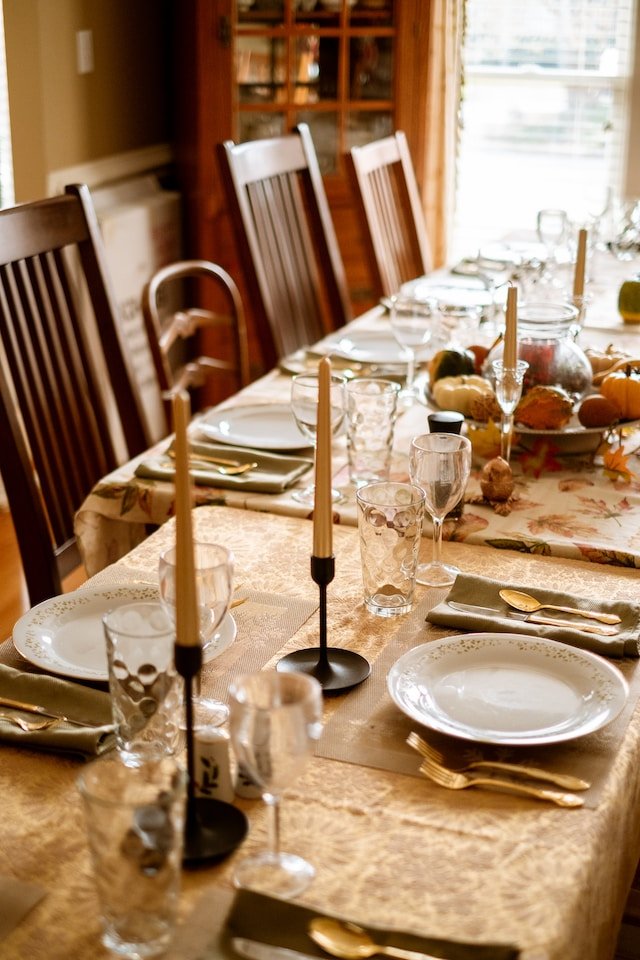Experiment 8: Feast in community.
Photo Credit: Virginia Simionato on Unsplash
This past Thanksgiving seated at a broad table laden with ten different dishes (not including dessert), it struck me how inefficient it is to feast in community. It’s a physical exercise–and a downright clumsy one. Cradling a dish of pecan-bedecked sweet potatoes, I burned my forearm.
But in the age of the touchless, how lovely this bustle of filling plates with bread and meat. The way it takes forever to pass around the mashed potatoes to fourteen pairs of hands, palm-to-palm, until each person’s plate is dolloped. Passing unwieldy casserole dishes of creamed corn, or attempting to hold one still while another takes a scoop of stuffing. Glass clinking against silver spoon and knife grating against plate. One person asking–almost every year– “Now which way are we supposed to pass around the dishes?”
Beautiful Strangers
Even clumsier than twenty-eight hands trading thirteen-by-nines around a ten-foot table is sitting shoulder to shoulder with fellow human beings, those strange others. Inhaling their cologne, hearing their stomachs squelch. And with the family we are given (rather than friends chosen according to our liking), the clumsiness can intensify.
Here at the table, we attempt to start conversations that soon fizzle and get stuck in others we can’t stop. Here we slurp and belch. Here we brush against generational differences, varying faiths: unique universes of desire, pain, and memory banging against one another.
Here we look mother and grandfather, uncle and cousin, friend and stranger in the eyes. Here we feel the warmth of their near bodies, hear the rhythm of their breath. Here we offer and receive the stories of our lives along with the rolls and butter.
It is a beautiful thing.
A God Who Feasts
Rather than shirk the communal table with its bluster and bustle, Jesus embraced it. The Gospel writers recount many stories of Jesus eating in community, so much so that He earned a reputation as a glutton and drunkard (Luke 7:34). Jesus was also known for eating with the unwanted and uncouth. Strangers. The ones no one wanted to sit next to. He smelled a prostitute’s perfume and the tax-collector’s sweat. He jostled elbows and passed around the bread.
Several times in the past year, God has brought me to the story of two disciples walking the road to Emmaus (Luke 24: 13-35). Rumors rumbled that Jesus’ tomb was empty: that He was not dead, but alive. A stranger tenderly accompanies the traveling disciples, hears their troubled hearts, then explains the ancient prophecies of a God who dies, then lives again.
In meditating on this story, Ruth Haley Barton notes how the companions opened their conversation to a stranger, welcoming the other. A stranger doesn’t have to be someone you don’t know; it can be someone you find strange or incomprehensible: like the prostitute and tax collector in Jesus’ day, like the “canceled” in our own. Like the tree-hugging liberal or the fundamentalist conservative, like the quiet one or the life of the party, the tattooed or the straight-laced. What if we treated each unique expression of humanity as Christ Himself?
Barton writes, “If we could see our “otherness” as a gift, rather than a problem or an inconvenience, we would all be changed for the better.” Engaging with someone of another generation, of another opinion, of another vibe is a gift.
As evening darkens the Emmaus road, the three travelers gather in the intimacy of a dinner table. Perhaps there are clanking cups and heavy dishes to be passed around. Perhaps stomachs gurgle in hunger. Before eating, the stranger takes the bread, blesses and breaks it, then gives it to his companions. In that moment, their eyes are opened and they recognize the stranger just before He vanishes: Jesus!
Seeing Jesus at Table
It is in breaking bread, in sitting together at table, that Jesus’ presence is revealed. While eating in community, gathered together around broken bread, God-With-Us is experienced. In the words of Job, My ears had heard of you, but now my eyes see you. (Job 42:5)
As I think of Christmas feasts to come, I am challenged to see Jesus in the passed casseroles and clinking spoons. In the stories offered and received. But mostly in the faces of each God-made being sitting around the festal table.
Stay with us, Lord,
since the day is far spent and the night is coming;
kindle our hearts on the way, that we may recognize you in
the Scriptures,
in the breaking of the bread, and in each other.
As the poor widow welcomed Elijah,
let us be open to the richness and miracle in meeting.
As Abraham and Sarah welcomed passing strangers,
let us entertain the possibility of angels in disguise.
Let our eyes be opened, that we may recognize in our neighbor
the divine presence of Christ.
Amen.
~ from the Iona Abbey Worship Book
